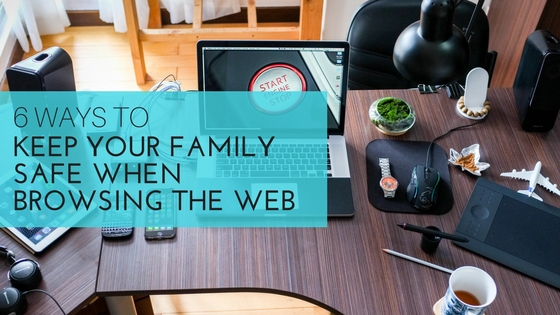The internet has become such a staple of our culture that it’s commonplace to have multiple devices in our homes that can access it in seconds. Many of us have smartphones, personal laptops, tablets, and family computers. Most schools now require the internet to complete school assignments and many of us use the internet everyday for our jobs. We connect with friends, check out the news, and make regular purchases online. The internet is an integral part of life, but there are also quite a few risks associated with putting your personal data online. So, how can you protect yourself and your family while browsing the web?
Educate your kids
One of the first steps you should take is making sure your kids understand the basics of internet safety. No matter how old they are, they could be at risk, whether from strangers or through sharing personal information. Reinforce the importance of not sharing personal information with a stranger or someone they haven’t met in person. You can’t keep them away from the internet forever and they’ll need it for school, so just regularly talk to them about safety and internet usage.
Monitor your statements
For many of us, we often become far too busy to keep up with the various charges we’re making to our bank accounts or credit cards. However, when you receive statements and if you have apps or check your balances online, make sure you can remember making every purchase. If something appears fishy, do not be nervous about freezing your card and looking further into the purchase. Sometimes, the purchase could be small and seem innocuous, but it means someone’s compromised your card.
Do not share personal info
Even if an email or offer looks legitimate, do not share credit card or personal information unless the site is labeled as secure. The site itself might not be a scam, but if they don’t use a secure page, a hacker could get in and steal your information. Be smart about who you’re giving private information to online.
Do not save cards
I know it might be tempting to save card information to your accounts for convenience, but it’s much less convenient to have to cancel your cards and sort through fraud on your accounts. Avoid saving card information and instead re-enter it each time. It’s also smart to use the same card for all online purchases, so you only risk one card being compromised.
Keep your WiFi secure
One of the biggest mistakes people make with internet security is not using secure WiFi when accessing sensitive sites. While most WiFi is secure enough to log into your bank account, it’s important to be careful about where and how you do it. Make sure the WiFi in your home is secure enough to prevent people from hacking in; you can achieve this goal by regularly updating and randomly generating your passwords.
Make strong passwords
I previously wrote about some tips on keeping your blog secure, which included making sure you regularly update your password and make it a pretty strong one. The same holds true for all of your accounts and personal devices.

